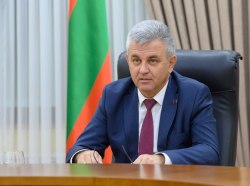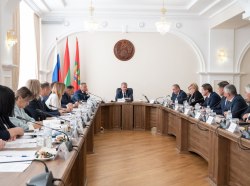The Pridnestrovian Republican Bank (PRB) is not only monitoring the present situation in the foreign exchange market, but is also correspondingly responding to it, despite the bank's limited jurisdiction, reads a statement by the chair of the central bank, Edaward Kosovsky, published in the latest PRB Bulletin.
The head of the PRB notes that the long procedure of coordination, unfortunately, diminishes the efficiency of anti-crisis measures in the foreign exchange market.
According to him, the exchange rate issues have arisen for good reason and are based on serious prerequisites. In 2015, exchange currency purchase exceeded sales for the first time, with December's demand being twice as high as supply.
«In 2015 citizens bought $232.6-million-worth of currency, 36% of which were secured by the central bank's unprecedented cash interventions at an amount of $71 million. In many respects it was due to a sharp decline in currency inflow to Pridnestrovie. So, private money orders from abroad decreased by 2,4 times to $80.3 million in 2015. Exports fell by 15% to $611 million, which have resulted in the corresponding reduction of currency receipts to the country," notes the PRB's chair.
He underscores that in January-February the situation became even worse: the amount of foreign money orders further fell by 25%, and exports decreased by 9%. It had happened before a new power supply contract was signed with Moldova. The price for Pridnestrovian electric power decreased by 28% afterwards. «Only this factor is expected to reduce exports by 10−15%," emphasises Edward Kosovsky.
He recalls that back in February-March the PRB worked out an action plan aimed at stabilising the foreign exchange market. It comprised the resumption of the mandatory sale by exporters of a part of currency earnings; the reduction of the maximum currency cash amount from $5,000 to 1,000 which citizens can have without declaring when leaving the country; the alteration of conditions for holding currency biddings, including a delay in the supply of purchased currency; the introduction of a currency purchase tax; the prevention of foreign exchange speculations.
At the same time, Edward Kosovsky underscores that until recently the Pridnestrovian Republican Bank has avoided making broad statements and followed the non-disclosure policy.
«The agiotage has begun to escalate and become avalanche-like after the mass media made public some confidential information. It is the early publication of this information (before the coordinated decision was made at top level) that have caused the destabilisation in the market and confrontation in high spheres. I'd like to point out that the misrepresentation of facts forms distrust of government institutions in general, regardless of a branch they belong to, and complicates the resolution of the crisis situation," reads the statement by the chair of the PRB.
Edward Kosowsky notes again that the 10-million loan offered by Agroprombank cannot solve the main problem: lack of foreign currency to meet the needs of citizens and businesses.
The chairman highlights another important issue — the central bank must be independent. Only this can prevent the bank from being affected by politically charged decisions. «Only in case of making independent decisions can the regulator [bank] be fully accountable for their implementation," concludes Edward Kosovsky.








